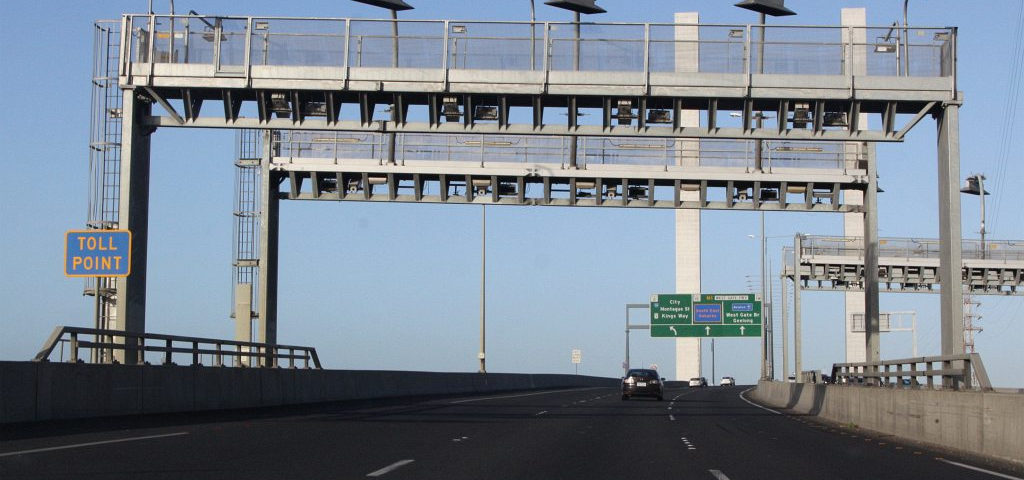A new hardship team to help drivers struggling with soaring toll road debts will be set up by CityLink operator Transurban in response to mounting pressure to reform their payment regime.
Community legal groups have long called for changes to the tolling enforcement system, which has lumped some drivers with debts of several hundred thousand dollars.
Toll road enforcement places a massive burden on the criminal justice system. In recent years driving on CityLink without a valid pass has topped the list of charges before magistrates courts.
Victoria Legal Aid economic and social rights program managing lawyer, Damian Stock, said the support service regularly provided advice to drivers with toll road debts exceeding $100,000.
“The highest I think we’ve seen is someone with $450,000 in road toll debt,” he said. “That’s our record here.” [Click here to read the full story]
Toll roads taking their toll
What you may not know is that in Australia, toll collection is dominated by a single ASX-listed, multi-billion-dollar Melbourne-based company called Transurban, and it’s operating under lucrative state government contracts which generally run up to 30 years or more.
Over the 12 months up to 30 June 2017, Transurban’s toll revenue rose 11.4% to $2.083 billion while its after-tax profit went up 850% from $22 million to $209 million.
But it’s questionable whether Transurban, which collects toll charges on 13 of Australia’s 16 toll roads, is dedicating enough of these funds to customer service.
Some would say the road toll business model itself is less than customer-friendly.
State governments have little oversight over whether the toll collectors they contract out to are being fair to motorists, but it’s often the state agencies that will come after you if you fail to pay.
And failure to pay – even if you’re unaware you’d incurred charges – will see the original toll fee multiplying each day as hefty administration fees tacked on by the toll collector are eventually topped off by a state-issued fine.
Once the state comes after you, it’s out of the toll collector’s hands.
It doesn’t help that the toll collector’s administration fees appear to be well out of line with any semblance of cost recovery either.
Fines frenzy
As of March 2017, Queensland’s road-toll debt was $233 million. And in Victoria, infringement warrants for toll fines added up to $687 million in 2015, according to WEstjustice.
About 70,000 Queenslander motorists who are in arrears simply can’t afford to pay down this outstanding debt, according to a recent report by the Queensland parliament. For these citizens, unpaid community service may be the only option.
The degree to which these fines are attributable to mistakes on the part of the toll collector rather than the motorist is open to question. But big toll collectors like Transurban will certainly play hardball when it comes to collecting unpaid tolls.
Costly mistakes
In one case cited by Toll Redress, a Queensland-based toll user advocacy group, a Brisbane man ended up $30,000 in debt and had his licence suspended as a result of what he said was a lack of proper notification from Transurban and the piling on of a $23.46 administration charge for every unpaid $4.39 toll.
When he said he could afford to pay the tolls but not the admin fees, Transurban said no deal. So the driver contacted Toll Redress, who helped make the case to Transurban that its administration fees greatly exceeded the cost of issuing invoices.
Transurban eventually waived the fees and the unpaid tolls.
In another case in late 2016 that appeared on A Current Affair, the owner of a small trucking business attempted to resolve $1800 worth of toll charges levied by Transurban’s Brisbane brand, Go Via, that were incorrectly invoiced.
He got nowhere with Go Via and ended up receiving a $66,000 collection notice from Queensland’s State Penalty Enforcement Registry after administration fees and state fines were applied. The Registry then seized and sold one of his trucks to clear the debt.
If complaints are anything to go by, Go Via is the most troublesome toll road currently operating.
At fault by default
According to Toll Redress co-founder Michael Fraser, the service has heard from hundreds of consumers from all walks of life who’ve been caught up in costly disputes with Transurban.
“It seems to be a system that’s designed so that whether it’s the fault of the toll collector or the driver, it becomes the fault of the driver by default. And because of not-always-reliable notification procedures, you can just keep driving and thinking everything’s all good until you receive a bundle of notices in the mail.”
A common problem, says Fraser, is when Transurban declares that a toll user’s account has insufficient funds to cover a direct debit, so suspends the account and starts charging a higher rate per toll.
“The first you’re going to hear about it is when you get a notice in the mail,” explains Fraser. “By the time the driver catches on to what’s happening, multiple toll notices are in the mail, each with a high administration fee,” he adds.
And if you don’t get the letter because of postal issues or your details aren’t up-to-date with the motor vehicle registry, you can expect a state infringement notice and hundreds of dollars owed per unpaid toll.
“In many cases, drivers have demonstrated to us – and attempted to demonstrate to Transurban – that their accounts were in fact fully solvent and the mistake was Transurban’s or the bank’s. A lot of people tell us that they never received a notice as well, so they end up owning hundreds of dollars for an alleged infraction that they were completely unaware of. When this happens, Transurban is not easy to deal with,” says Fraser. [Click here to read the full article]





